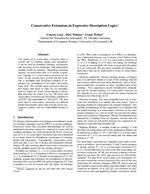Conservative Extensions in Expressive Description Logics
Aus International Center for Computational Logic
Conservative Extensions in Expressive Description Logics
Carsten LutzCarsten Lutz, Dirk WaltherDirk Walther, Frank WolterFrank Wolter
Carsten Lutz, Dirk Walther, Frank Wolter
Conservative Extensions in Expressive Description Logics
In Manuela Veloso, eds., Proceedings of the Twentieth International Joint Conference on Artificial Intelligence (IJCAI'07), 453-458, 2007. AAAI Press
Conservative Extensions in Expressive Description Logics
In Manuela Veloso, eds., Proceedings of the Twentieth International Joint Conference on Artificial Intelligence (IJCAI'07), 453-458, 2007. AAAI Press
- KurzfassungAbstract
The notion of a conservative extension plays a central role in ontology design and integration: it can be used to formalize ontology refinements, safe mergings of two ontologies, and independent modules inside an ontology. Regarding reasoning support, the most basic task is to decide whether one ontology is a conservative extension of another. It has recently been proved that this problem is decidable and 2ExpTime-complete if ontologies are formulated in the basic description logic ALC. We consider more expressive description logics and begin to map out the boundary between logics for which conservativity is decidable and those for which it is not. We prove that conservative extensions are 2ExpTime-complete in ALCQI, but undecidable in ALCQIO. We also show that if conservative extensions are defined model-theoretically rather than in terms of the consequence relation, they are undecidable already in ALC. - Forschungsgruppe:Research Group: AutomatentheorieAutomata Theory
@inproceedings{ LuWaWo-07,
author = {Carsten {Lutz} and Dirk {Walther} and Frank {Wolter}},
booktitle = {Proceedings of the Twentieth International Joint Conference on Artificial Intelligence (IJCAI'07)},
editor = {Manuela {Veloso}},
pages = {453--458},
publisher = {AAAI Press},
title = {Conservative Extensions in Expressive Description Logics},
year = {2007},
}
